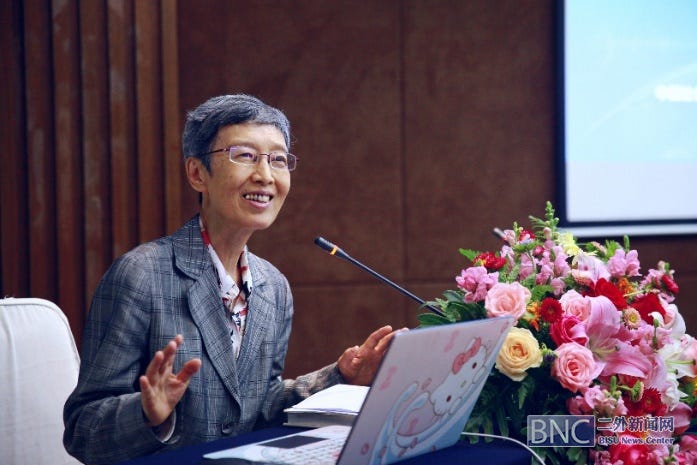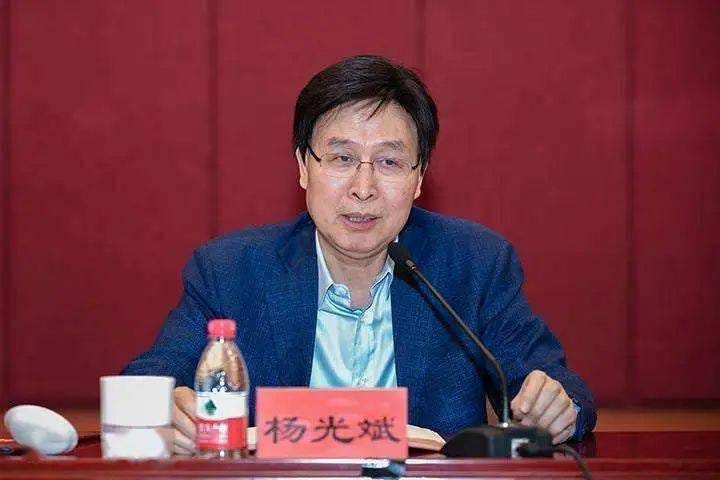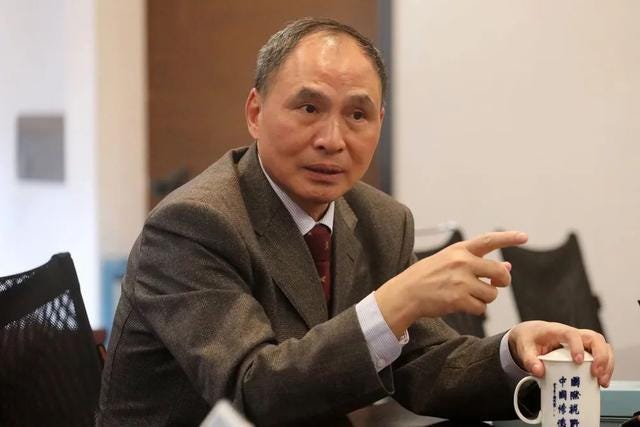Discourse Power | May 2, 2022
A rising China and smaller countries, resisting Anglo-Saxon hegemony, and shaping global narratives
Eid Mubarak,
As I mentioned yesterday, all readers are encouraged to respond to this email with suggestions for articles and other sources to be featured in future editions. Better still, if you can produce high-quality translated summaries of original Chinese sources, I'd be glad to include them with your name and affiliation.
Editors and researchers - if you find the content useful and would like to help Discourse Power grow, consider adding a reference/hyperlink in your own work.
For more translated articles by Chinese thinkers, Reading the China Dream by David Ownby published today full translations of articles by CICIR President Yuan Peng and Peking University law professor Jiang Shigong.
Discourse Power is still in its beta stage. Suggestions, comments, and airing of grievances are welcome.
Thank you for reading,
Tuvia
Top Picks
“Faced with aggressive US suppression, some Chinese citizens have fallen into the Cold War mental trap of hegemonic and antagonistic sentiments, with some even claiming that as China grows stronger, the moment would come when it will replace the US. This viewpoint, according to the author, is not just wrong but also dangerous”
Sun Ge, a Distinguished Professor at Beijing International Studies University and a former researcher at the CASS Institute of Literature, believes that turning China into a second America would be a betrayal of the Non-Aligned Movement, rather than a triumph.
Sun Ge proposes a world view different from major power competition over global hegemony or Cold War-like rivalry between opposing systems by reviewing the Non-Aligned Movement (NAM), which arose out of the Cold War:
“The NAM countries have always avoided becoming vassals of major powers, refused to be used as a pawn in major power hegemony, criticized the concept and practice of confrontational camps and military alliances, and sought to establish a new international order based on equality, inclusion, and pluralism.
“Despite the fact that China was not a member of the NAM, our international strategy and foreign policy, from the Five Principles of Peaceful Coexistence to a Community of Shared Future for Mankind, are based on the historical logic of Chinese pluralism. This is why China has made it clear to the rest of the world that it desires win-win cooperation.
“Through a conceptual lens based on cooperation rather than alliances, China's proposed initiatives of win-win cooperation and building a community of a shared future for mankind might operate as guiding principles for a new international landscape.
“As a major power, China must take full responsibility for promoting the multi-polarization of international relations by forging relationships with weaker nations based on equality and companionship rather than alignment. This is dependent not on our might, but rather on our ability to believe in and support equality and a realistic approach to world peace.” (Beijing Cultural Review)
“The Russian-Ukrainian war will alter the strategic direction of Russian-Chinese relations... China will undoubtedly be a great asset in the Russian economy's future recovery and development”
According to Prof. Yang Guangbin, dean of Renmin University of China's School of International Studies, "Russian resistance" to the Western-led global order predates the Russia-Ukraine conflict and is part of a century-long struggle between Russian Slavs and capitalist White-Christian Anglo-Saxons.
Excerpts:
“The Anglo-Saxon nation has dominated the world system for 300 years. The first feature of this system is its brutality 残酷性. The Anglo-Saxons are the most aggressive, violent, and vicious of all the great expansionist countries, according to William H. McNeill, a pioneer in the study of world history.
“Another distinguishing feature is their lack of equality. Capitalism is defined as an economy based on capital inequality. Furthermore, its Juggernaut System* is the outcome of the American military-industrial complex, a set of governmental and economic structures developed around the time of WWII. With this type of system in place, war is a foregone conclusion. Lastly, such features determine that expansionism is in their nature and war is their way of life.
[*This is a reference to a 2016 People's Daily article by Yang, in which he paraphrased George Kennan, that described the USSR as a "juggernaut" that, unless met with strong resistance, would be unstoppable. The same can now be said of the United States, argued Yang, adding that it has evolved into an unstoppable Juggernaut System driven by the "monster" of capital power and moving inexorably toward foreign expansionism.
Due to the name of the newsletter, I felt compelled to add this quote from Yang’s 2016 piece: “China's ideological power, i.e., discourse power, is non-commensurate with our international standing. In this regard, developing a discourse system based on Chinese philosophy and social sciences should be our most pressing task. Cultural confidence is directly influenced by discourse power. We can only confront the numerous issues in Sino-American relations with a confident and healthy mindset.”]
“Russians have always been considered Orthodox Tartars with a white appearance by Anglo-Saxons, i.e., ‘not our people’. The takeaway is that it does not matter what system you have in place, even if you are a mega-state - as long as you are not Anglo-Saxon, you will always be a threat.”
“Beginning with the Paris Commune [1871], the Soviet Union established during World War I was the first to defy the capitalist world order… The ‘integration’ of the Soviets into the capitalist world order began with Mikhail Gorbachev, not with the demise of the Soviet Union. As a counterbalance to the United States, the two failed attempts to ‘integrate’ into the world order resulted in the ongoing Russian-Ukrainian war.
“After the collapse of the Soviet Union, Russia sought to join the Western camp so that it could concentrate on development, and the US told Russia that NATO would not expand to the east and that they would live in peace. Instead, not only was Russia denied membership in NATO, but the alliance grew five times until it sought to include Ukraine.
“Ukrainians, who have never known what it is like to be an independent country, are an exceedingly immature/unsophisticated nation 不成熟的民族 that is politically at the mercy of others. They're willing to be used as pawns in the onslaught against Russia, putting Russia's national security and territorial integrity in jeopardy even while sacrificing themselves.”
“[As a result of Russian resistance] The United States has lost its moral high ground in terms of global dominance. As the myth is shattered and the concepts that underpin the international system no longer stand, the world will require a new sense of direction. The question of whether the global order as a whole will be altered as a result is one worth waiting for. Because the United States has now gained hard power at the expense of soft power, more military adventurism cannot be ruled out.
“Finally, it should be noted that the Russian-Ukrainian war will alter the strategic direction of Russian-Chinese relations. Russia, which has been sanctioned by the US and the West, will undoubtedly rely more on the internationalization of the Renminbi, and its previously Western-centric foreign trade will undoubtedly shift to a more Eastern-centric economy. China will undoubtedly be a great asset in the Russian economy's future recovery and development.”
“This historic juncture is unquestionably a strategic opportunity for China's development. China must stick to its strategic plan of transforming the world through self-development. China's scale is far too vast, and as China expands, the rest of the world will inevitably change with it. Countries at the top of the food chain, of course, will not patiently wait for China to evolve into a world power.
“In the last 300 years, it has mostly been the Anglo-Saxons, Russians, and Chinese who have been able to construct and alter the global order. Each has endeavored to modify the world in their own unique way due to their different civilizational genes. Despite the bloodbath that has become the norm in global affairs, the peace-loving Chinese must summon the fortitude and spirit of the War to Resist US Aggression and Aid Korea.” (Guancha)
“The Ukrainian crisis has made people more aware of the fact that President Xi's concept of common, comprehensive, cooperative, and sustainable security, initially proposed eight years ago, offers extremely significant theoretical and practical implications for international relations and the future of mankind”
According to Wang Wenqi, Counsellor of the Secretariat of the Xi Jinping Thought on Diplomacy Research Center at CIIS, Xi Jinping's Global Security Initiative is "the remedy for existing distorted security concepts."
Xi Jinping Thought on Diplomacy Research Center is part of the China Institute of International Studies (CIIS), a think-tank of the Ministry of Foreign Affairs.
The Global Security Initiative (GDI) was first introduced by President Xi on April 21 during a video address at the opening ceremony of the Boao Forum for Asia Annual Conference 2022. According to party-state media, he proposed the GDI "with the future of all humanity in mind."
It reportedly joins the Belt and Road Initiative (BRI) and the Global Development Initiative (GDI) as "another global public good offered by China, as well as a vivid illustration of the vision of a community with a shared future for mankind." All three initiatives are defined by official sources as "providing Chinese wisdom, Chinese solutions," as well as an “impetus to improve global governance.”
Wang writes: “The unprecedented devastation caused by the two world wars prompted the international community to draw lessons from the bitter experience and work to create a more stable global security architecture, including the UN Security Council and other institutions, which have played a critical role in preventing war and maintaining peace.
Quoting from The Smiling, Proud Wanderer, a novel by popular 20th-century Wuxia novelist Jin Yong (Louise Cha), Wang adds: “Yet, ‘the devil within never stops its devilish schemes 心魔才是魔.’ Some countries and individuals are strongly steeped in the traditional Western international relations notion of the ‘winner takes it all’ and ‘zero-sum competition."
Wang concludes that “Security is an innate human need, and President Xi's security concept is valuable since it is founded on profound logic, strategic thinking, and a human-centric perspective. It has thus shown the essence of security in an increasingly globalized world, and as such, it is the only way to overcome global security dilemmas.” (Global Times)
“Controlling global narratives is critical for Europe and the United States because it allows them to construct a monocentric network of power that is laced with discursive manipulation through which they control human emotions, morals, and ideology”
Zhang Hai, a professor at Northeast Normal University's School of Media Sciences and a visiting professor at Osaka University in Japan, explains how to respond to the global narratives of Europe and the United States, as well as how China and other countries may "tell their own stories well".
“First, we must critically absorb the rational kernel of Western global narratives and carry forward the essential core narratives of Socialism with Chinese Characteristics in order to develop a future with more pluralistic methodologies for compellingly communicating global stories well.
“Second, we should adapt to globalized communication undertakings, support countries around the world in developing diverse perspectives, and create a global storytelling network that corresponds to China's global communication activities.
“Third, we need to facilitate the identification, production, dissemination, research, and exploration of transnational cultural symbols and mechanisms, and create an innovative globalized system and strategic toolbox for shaping global narratives. “ (Global Times)
“If an Asian version of NATO is formed in the future, Asian countries would never be able to live in peace. As a result, I am particularly opposed to NATO, and even more so to the US attempts to establish an Asian version of NATO”
Pro. Zheng Yongnian of the Chinese University of Hong Kong (Shenzhen) describes how China should handle relations with smaller countries.
Zheng was speaking at a session on sustaining peaceful ties in the South China Sea on the fringes of the Boao Forum for Asia Annual Conference in Hainan in April 2022.
Excerpts:
”Asian countries should be able to control their own destiny, as evidenced by our shared development over the last 40 years. So, how can we seize ownership of our own destiny? There are four crucial points, in my opinion:
“First, more international public goods should be provided by the major powers.
“Second, we need to remain open - now we are facing the US value-based bloc, which runs counter to globalization.
“Third, we must improve our relations with smaller countries; large countries must be accommodating 宽容... However, while guaranteeing such tolerance towards smaller countries, the latter should also recognize that the larger countries also have their own security concerns.
“More crucially, if small countries ignore the security concerns of major powers and "welcome wolves into their homes," becoming "agents" of other major powers, causing other nations in the region to feel vulnerable, the small countries will lose their security as well. A good illustration of this idea is the present conflict between Russia and Ukraine.
“Fourth, we must preserve positive relations with the United States - China may steer US inclinations towards military competition to economic competition instead, which is typically a win-win situation, whereas military competition is a zero-sum game.
“The South China Sea should, in principle, be an open and peaceful sea. We must all look out for our own interests and not be swayed by the interests of extraterritorial powers, since they will never serve the interests of Asian countries. In other words, given the self-interested ambitions of foreign forces, most Asian countries would - at best - become their proxy.” (IPP Forum)
Playing in the Background
Israeli jazz guitarist Gilad Hekselman and drummer Eric Harland give Pat Metheny a run for his money. The whistling sound is clearly influenced by harmonica legend Toots Thielemans, whose 100th birthday was commemorated by a Google Doodle on Friday:
Discourse Power is written by Tuvia Gering, a research fellow at the Jerusalem Institute for Strategy and Security and a Krauthammer Fellow, specializing in Chinese security and foreign policy, and emergency and disaster management. Any views expressed in this newsletter, as well as any errors, are solely those of the author.
Follow Tuvia on Twitter @GeringTuvia






